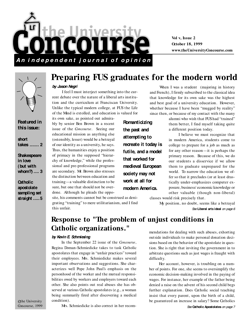The danger of over-generalizing a few instances of injustice
by Michael Welker
I would like to add a few thoughts to the discussion raised in Vol. V, Issue 1 of the Concourse by Regina Doman-Schmiedicke in her article, “The problem of unjust conditions in Catholic organizations.”
First off, the careful reader should be aware of the theoretical leap from a vague reference to “many FUS alumni” (who suffer the ill treatment of low wages and lack of job security) from a convenience sampling of three anecdotal histories. The author maintains that unjust conditions are widespread in Catholic apostolates. But these anecdotes are the only evidence she provides to support her claim. The main problems with this research method and sample design are (1) the incomplete sample and (2) the failure to control for potentially variable causes of the reported treatment. For instance, someone could easily provide anecdotes that suggest that conditions are actually opposite of those posited by the author, such as the fact that a recent graduate from the MA Theology Program at FUS just found a secure job at a parish paying in the high $30s. There are many other alumni who receive (some would argue) fair treatment in jobs within Catholic organizations. Without getting too involved in details, another likely criticism concerning the argument is its one-sidedness. We have information from the employee, but we lack information from the employer.
Further, the author’s analysis fails to exclude other possible causes (in research, this is important, for unless we rule out other likely causes, the cause we argue for rests on very weak legs). Let me offer a simple analysis: here we have a couple of cases of ill treatment. Isn’t it interesting that each of the cases involves FUS alumni? Now, we have received reports from employers of dissatisfaction with the attitude and work ethic of various graduates. Perhaps we are on to something here? You see, there is a chance that the employers share a similar characteristic: they hired FUS alumni! It is possible, even if only remotely, that when the employers are dissatisfied, then varied kinds of responses (albeit unjust) are perpetrated against employees. Yet, this happens in all organizations, not simply in Catholic organizations. However, you will argue, we need to hold the latter up to a higher standard. Perhaps we should not. After all, who are we to judge on the basis of a small sample, conveniently identified, and most likely not representative of the typical employer-employee relationship in such organizations. Of course, even one instance of an injustice is outrageous. I’ll admit that—sin is sin. But significant legal remedy is available for such cases. In other words, unethical treatment of employees may happen on occasion. If it really is a norm, as the author suggests, then we can expect bankrupting litigation to rear its ugly head before too long. (And, I suspect, legal remedy in the cited cases is still an option.)
In order to get an accurate picture of conditions in Catholic organizations, the research would need to be enhanced in two ways. First, the sample should be expanded to a randomly selected number large enough to establish statistical significance. We also need to control for potential competing explanations for the ill treatment. But suppose we were to do that and find that unjust conditions really are widespread? If so, I must criticize the author’s proposed solution, which appears to be collectivization of bargaining power in the form of varied Catholic workers unions.
While I accept the social teachings of the Church regarding the right of workers to unionize, in practice the corruption, productivity losses and social deterioration that unions create argue against their implementation in the present case. It would be a case of inventing a solution to a perceived problem (perceived from the point of view of the harmed persons) that may well prove to create more problems than it solves.
As a final note, I should like to propose we converse in a more specific manner concerning the political philosophy of distributism, which the author mentioned. (It has been mentioned several times in these pages, but always in vague terms.) The main problem with distributism, as I see it, is that while it champions ideals that are agreeable and noble, it does so without providing practical guidance for pursuing the path,or “way,” as some like to call it. All my attempts to focus attention upon the details, the facts, and all the essential practical means of realizing the ideals have come to nothing. I have never been satisfied that the Distributist ideal can be anything but a “banner” that can dupe the unsuspecting citizen into a desensitized state whereby some (likely “distributist” in name only) factions seize the reins of power. For instance, the program of distributing shares of capital, of letting the smallest units of society (families) have their own property, estates, businesses, and so on, is as far as I can gather, an impossibility without the use of force (and by and by, we know only one institution in society can make us do something, it’s government—because governments wield coercive powers). Thus, even though I agree with the ideal, I, too, cringe at the thought of government’s nose poking into places it is not needed. In that sense, then, I agree with Regina, but in so doing, I think I will have to call a spade a spade… she appears to me to be a closet classical liberal.1
Michael Welker is an Assistant Professor of Economics at FUS, and a PhD candidate at Kent State University. He is also Senior Vice President for C.G. Menk & Associates, Inc., a business and finance consulting firm headquartered in Maryland.
- The writings of Wilhelm Roepke are an excellent resource for showing where modern economic theory can prove useful in arguing that the Distributist ideal can be best maintained under a free market system. ↑


